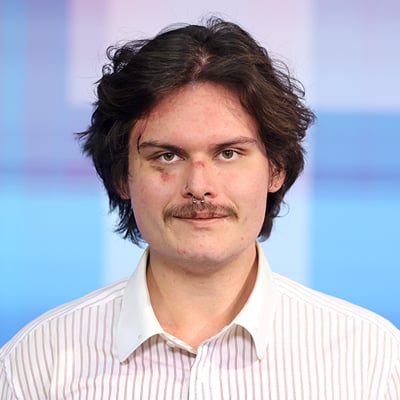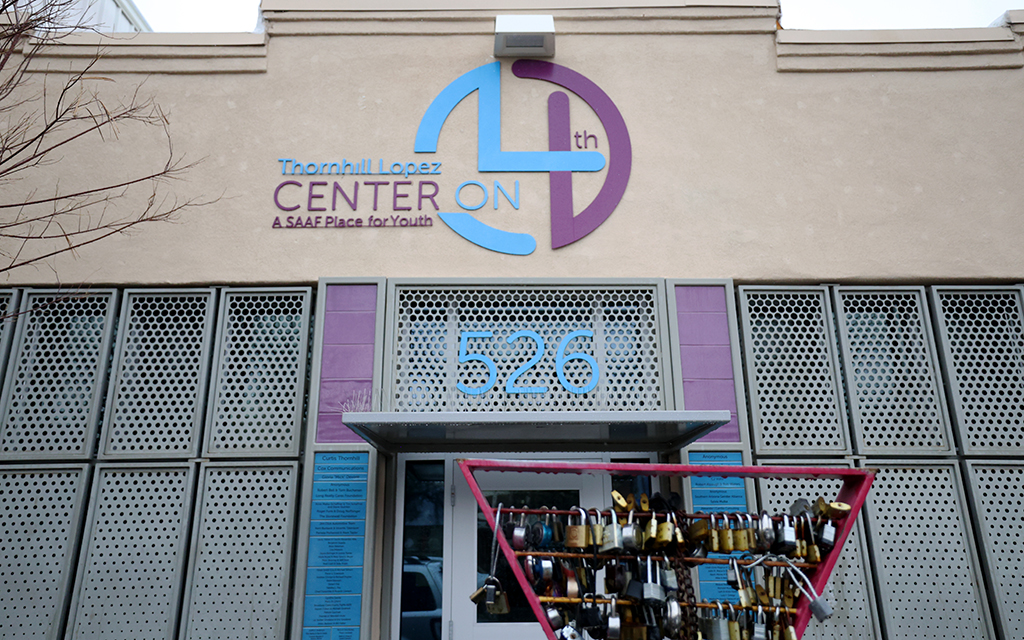
The exterior of the Thornhill Lopez Center on 4th in downtown Tucson. (Photo by Jack Orleans/Cronkite News)
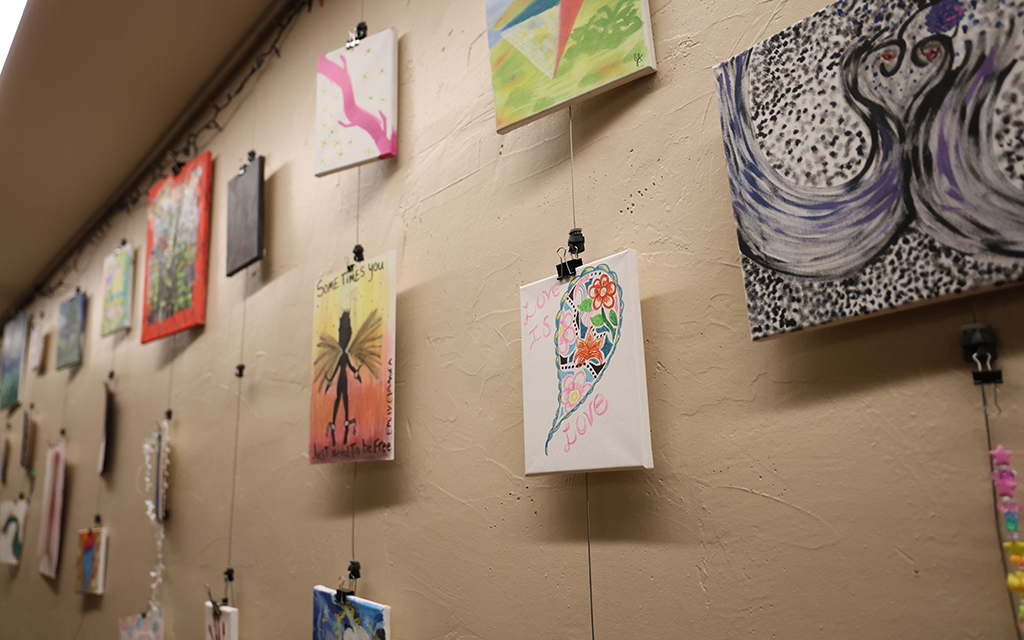
Paintings line a wall at the Thornhill Lopez Center on 4th in Tucson on Feb. 07. (Photo by Jack Orleans/Cronkite News)
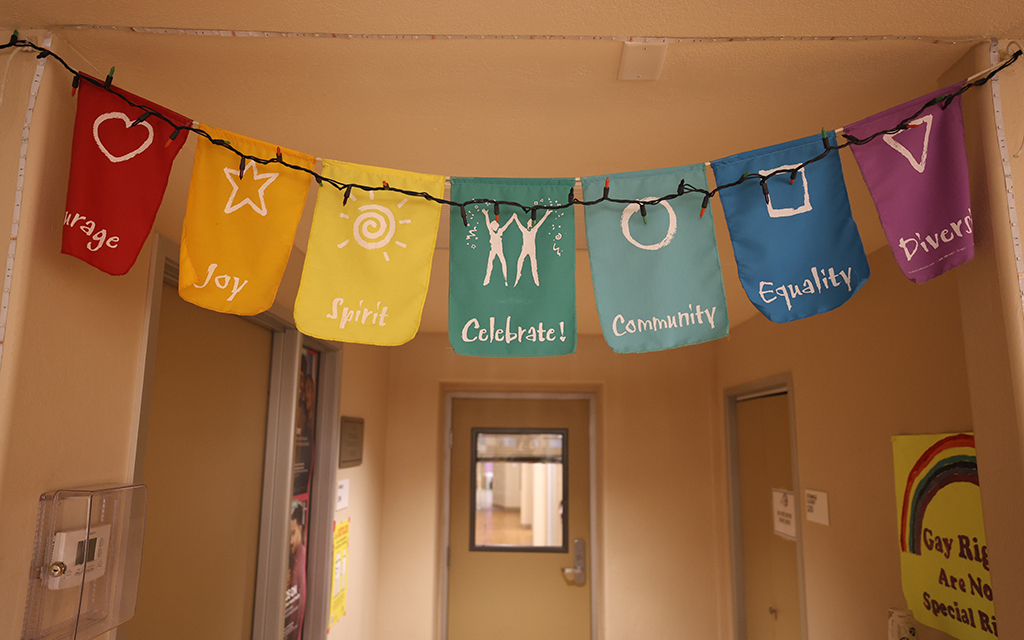
A row of affirmational flags hangs above a hallway in the Thornhill Lopez Center on 4th in Tucson. (Photo by Jack Orleans/Cronkite News)
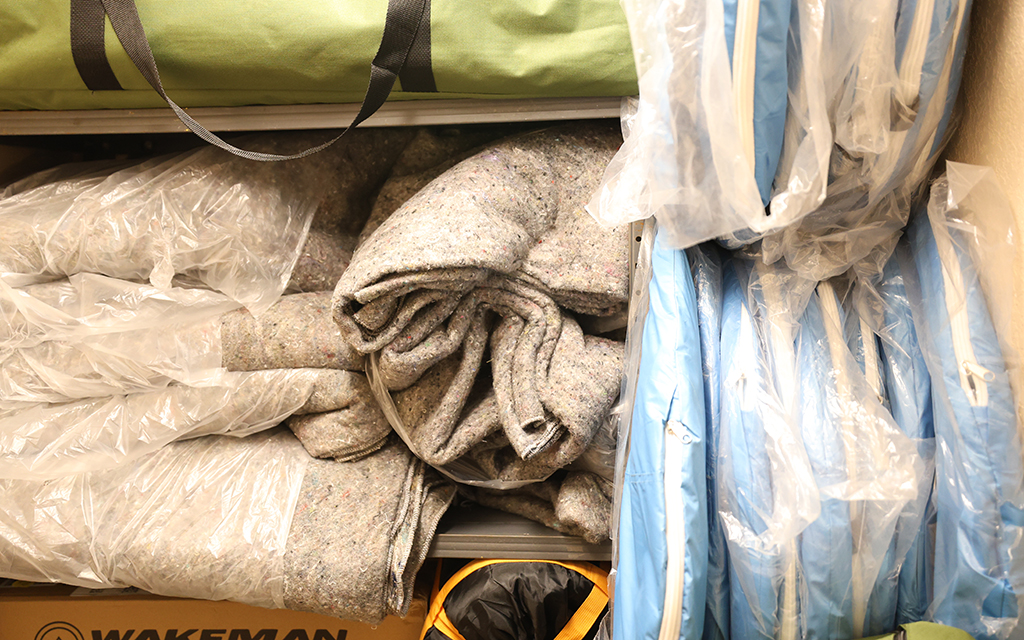
A closet at the Thornhill Lopez Center on 4th in Tucson contains blankets and shelter supplies for those experiencing unstable housing. (Photo by Jack Orleans/Cronkite News)
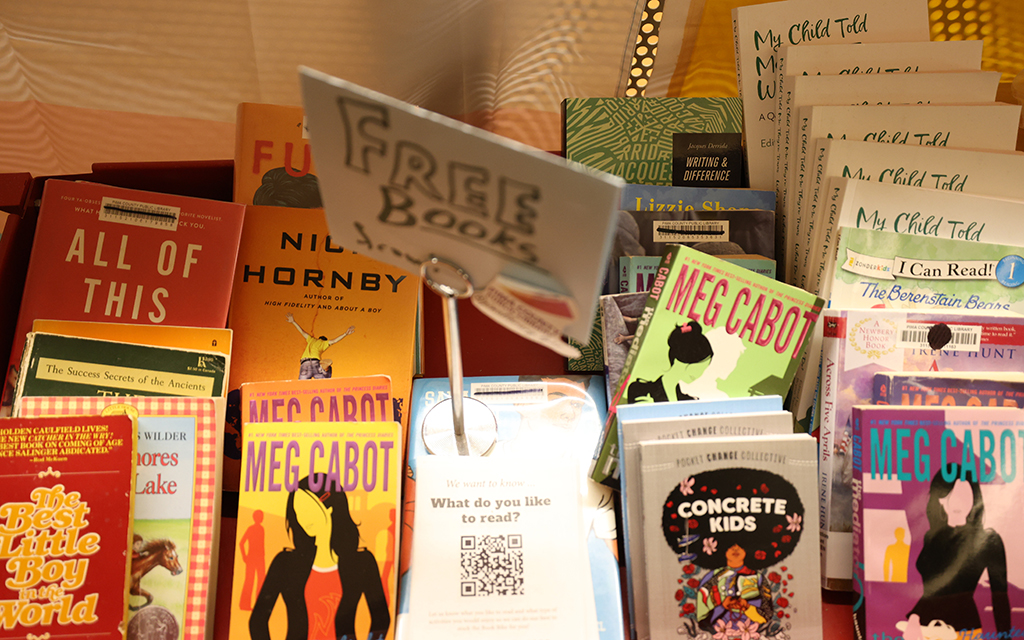
A rack of free books offered at the Thornhill Lopez Center on 4th in Tucson. (Photo by Jack Orleans/Cronkite News)
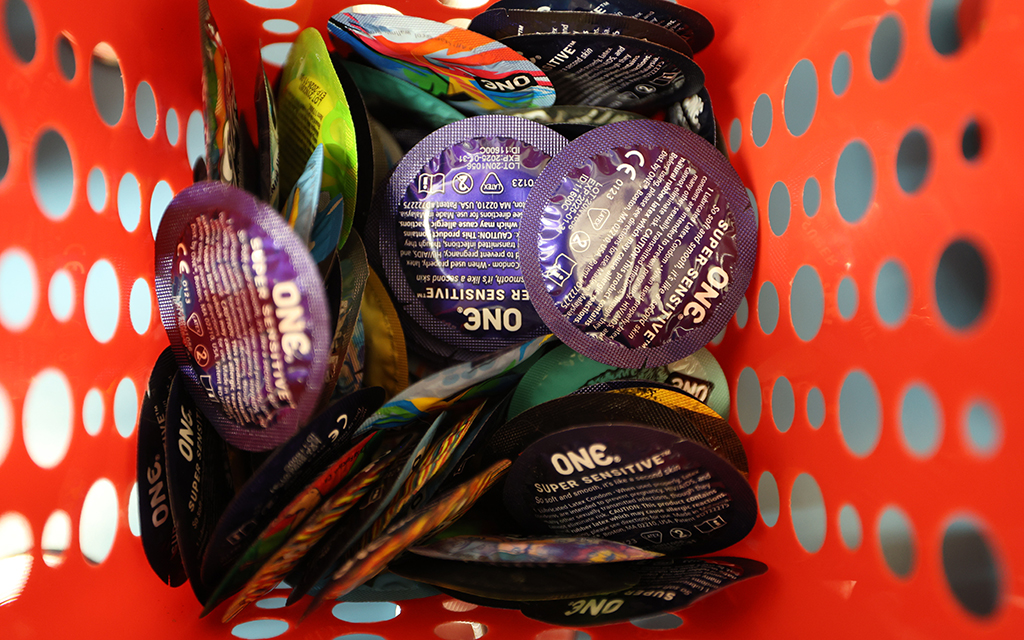
A bin of condoms sits on a table in the Thornhill Lopez Center on 4th in Tucson. The facility is filled with harm-reduction and awareness posters. (Photo by Jack Orleans/Cronkite News)
TUCSON – LGBTQ+ youth across the country are facing an increased risk for suicide, as reported by the 2023 U.S. National Survey on the Mental Health of LGBTQ Young People by the Trevor Project. At the forefront of this issue are conversations about anti-LGBTQ+ legislation, barriers to accessing mental health care and the importance of resources for the community.
The Trevor Project surveyed 28,000 LGBTQ young people from ages 13 to 24 across the U.S. and found that 41% of them seriously considered suicide. The report also showed that 49% of LGBTQ youth in Arizona seriously considered suicide and 16% of them attempted it in 2022.
Grayson Agrella, 21, is a queer transmasculine student currently studying anthropology, art history and French at the University of Arizona. He said that in his experience, restrictive legislation can contribute to mental health struggles.
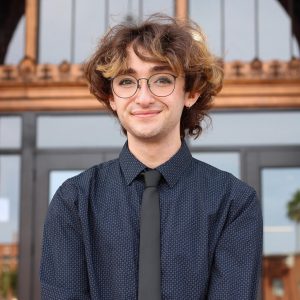
Grayson Agrella, an LGBTQ+ youth, says restrictive legislation can contribute to mental health struggles. (Photo courtesy of Grayson Agrella)
“You have to watch the country convince itself that you’re such a problem, and then you just have to go grocery shopping anyway,” Agrella said. “I don’t know how you’re supposed to move on with the rest of your life when everything is like this. I think it has a huge mental health impact, watching public sentiment turn against you, against an aspect of your identity.”
The American Civil Liberties Union, which has been tracking anti-LGBTQ+ bills in legislatures across the U.S., said that as of Tuesday there were 437 such bills, 11 of which are in Arizona.
The ACLU list includes bills that target health care access, public accommodations, schools and education, free speech and expression, access to accurate IDs and civil rights protections for LGBTQ+ individuals.
Katy Kandaris-Weiner, the clinical director of Inner Balance Counseling in Arizona, said that fear and uncertainty about the future are at the heart of this mental health disparity.
“There have been laws enacted regarding their ability to get services, which can create a lot of anxiety, stress, PTSD (post-traumatic stress disorder) symptoms, fears about talking about who they are and just difficulty being authentic in themselves,” Kandaris-Weiner said. “This all combines to create an atmosphere that, unfortunately, lends itself to mental health problems.”
While members of the community support one another, there is often a limited number of medical care providers trained in gender-affirming care.
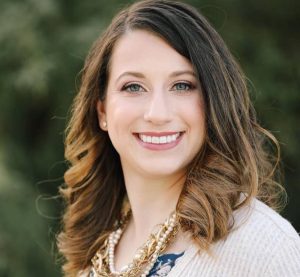
Katy Kandaris-Weiner, the clinical director of Inner Balance Counseling, says the lack of gender-affirming providers in Arizona is a concern. (Photo courtesy of Katy Kandaris-Weiner)
“I’ve definitely been in situations where I felt like I needed access that I didn’t trust the local hospital for,” Agrella said. “If you are in emergency situations and you know you’ll have to show up and give a 20-minute debrief on how to handle you as a patient, it feels like it’s not worth it to show up.”
The lack of providers is a concern among LGBTQ+ youth and their families as well as with mental health care professionals, like Kandaris-Weiner, who identify as gender-affirming. The Trevor Project 2023 survey said that, for a variety of reasons, “56% of LGBTQ+ young people who wanted mental health care in the past year were not able to get it”
“Whenever you’re going in for something, you look for a specialist,” Kandaris-Weiner said. “The harder it is to find someone, the more likely people get discouraged. Having more therapists trained who can help that population is really important.”
One of the available resources for LGBTQ+ youth in Tucson comes from the Southern Arizona AIDS Foundation. The foundation first began as the Tucson AIDS Project in 1985 and, over time, has evolved its mission to encompass LGBTQ+ outreach and advocacy.
The Thornhill Lopez Center on 4th, a building owned and operated by the foundation, has a long history in Arizona.
One of its prominent resources is the Eon Youth Lounge, a space where LGBTQ+ youth can come together to enjoy each other’s company. The lounge acts as the information center for the community and their families.
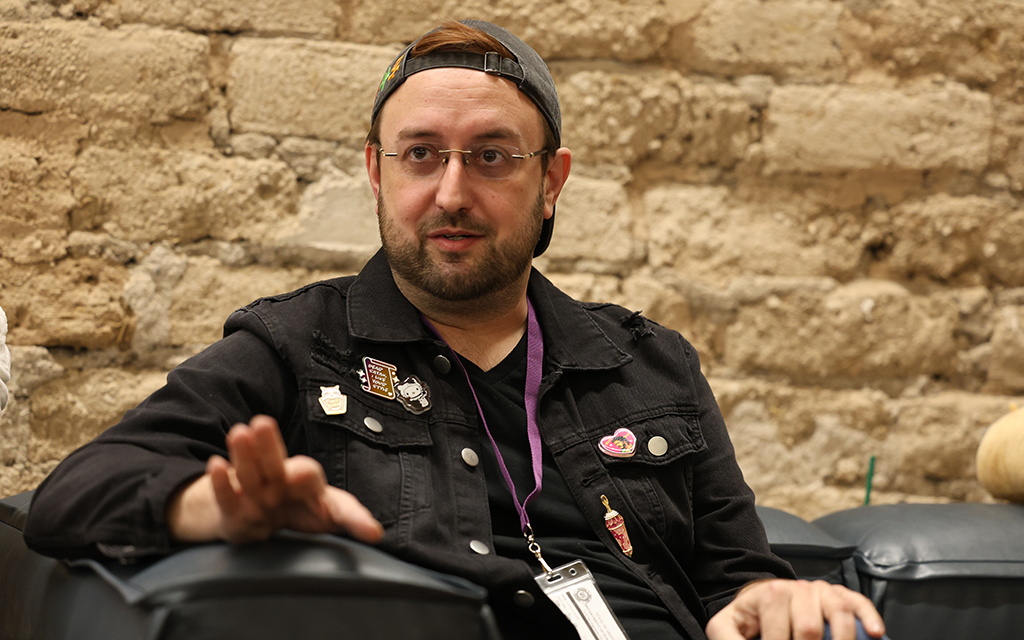
Emerson Kuhn, associate director of Southern Arizona AIDS Foundation’s LGBTQ+ program, at the Thornhill Lopez Center on 4th in Tucson on Feb. 7. (Photo by Jack Orleans/Cronkite News)
“Eon Youth Lounge has been around in some form or iteration since the 1970s,” said Emerson Kuhn, the associate director of SAAF’s LGBTQ+ program services. “A youth participant said that an eon is how long LGBTQ+ folks have existed and that is how long they will continue to exist. That’s where the name comes from.”
SAAF offers substance use prevention through its Youth Empowerment Leadership and Lifeskills, or YELL, program, sexual violence prevention and a suicide prevention program called ALLY, for Arizona Life Links for Youth.
Agrella’s first interaction with SAAF came about through Mapping Q, a collaborative program with the University of Arizona. Mapping Q is a “series of virtual art workshops for Arizona LGBTQIA+ youth,” and also provides the community with additional workshops.
“I did the suicide prevention training through the Mapping Q program,” Agrella said. “It was a room of queer people talking about how to ensure their own survival a little better, which is a big and scary conversation to have, but it is also so necessary.”
At the Thornhill Lopez Center on 4th, LGBTQ+ youth are introduced to these programs and welcomed into a space that celebrates their identities.
“Eon Youth Lounge is really built to be a safe space for LGBTQ+ youth and their allies who come together to build community and discuss various aspects of minority stress that they encounter,” Kuhn said. “As well as just to celebrate. To raise queer joy and queer visibility for the youth and really help them feel more empowered at who they are and how they interact in this world.”
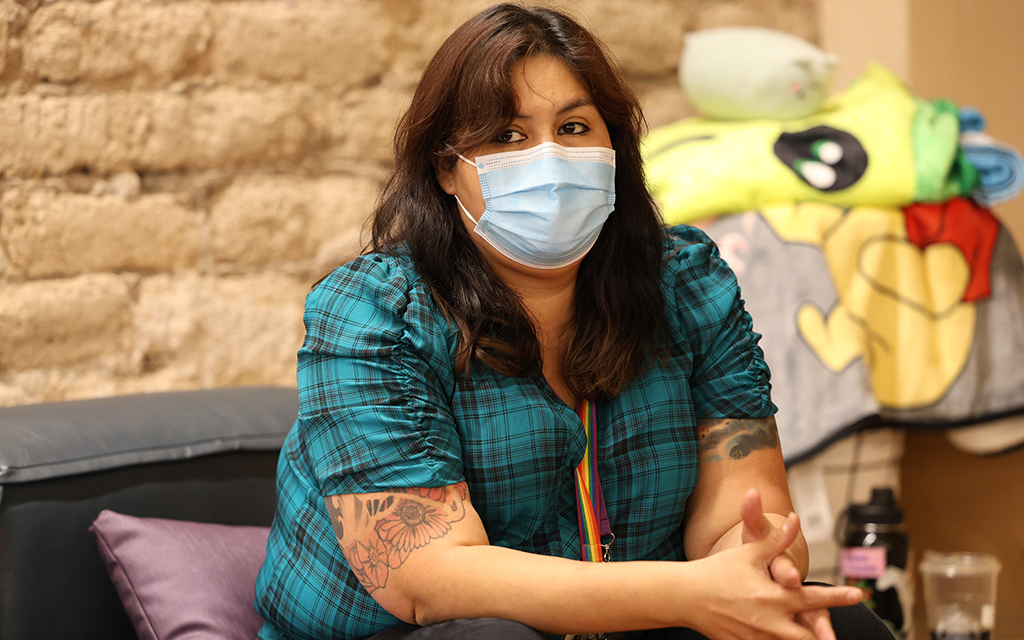
Celia Robidoux joins colleagues at the Thornhill Lopez Center on 4th in Tucson on Feb. 7. (Photo by Jack Orleans/Cronkite News)
Barriers to mental health care
Celia Robidoux, the director of the foundation’s LGBTQ+ program services, talked about how the community outside of these safe spaces impacts their mental health.
“Systemically, with the political climate and the rhetoric in the media, it is really hard to not feel like the community, particularly transgender nonconforming youth, are being attacked in really horrible ways,” Robidoux said. “A majority of youth that do experience negative thoughts about their identity are also hearing negative things about the LGBTQ+ community at home.”
Bre Wandrych, a psychotherapist and licensed master social worker in Phoenix, said these external attitudes can create barriers to accessing care.
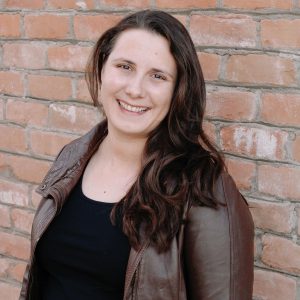
Bre Wandrych, a psychotherapist and licensed clinical social worker in Phoenix, says societal attitudes can create barriers to accessing care. (Photo courtesy of Bre Wandrych)
“Certainly one of the barriers is that minors need consent from parents,” Wandrych said. “If they are not out or their parents are not supportive, it can be difficult.”
Agrella said he has been fortunate to have strong family support.
“I’ve been extremely lucky that my parents are supportive and accepting and willing to make things work to find the resources that I need,” Agrella said. “Watching people go through situations where their family would rather they don’t exist as their authentic self is absolutely devastating. It’s demoralizing.”
The COVID-19 pandemic had a direct impact on both access to care and access to community for LGBTQ+ youth in need. David Vargas, the bilingual health education specialist for the AIDS foundation’s YELL program, has observed the impact of social isolation on the community firsthand.
“The pandemic taught a lot of us that isolation was safety, especially for young people,” Vargas said. “I’m currently teaching high schoolers whose entire middle school life was remote. That very crucial point of growing up in our community and testing boundaries, they did not have that. It was all through a screen.”
To help combat this lack of accessibility for LGBTQ+ youth seeking mental health care, providers have begun creating alternatives for those who have limited access to transportation.
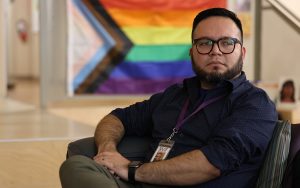
David Vargas listens to Danielle Fowler speak on Feb. 7 at the Thornhill Lopez Center on 4th in Tucson. (Photo by Jack Orleans/Cronkite News)
SAAF built Eon Youth Lounge satellite sites to give LGBTQ+ youth across Tucson comfortable spaces to get together.
“While we have Eon Youth Lounge here in the center every Thursday night from 6 to 8 p.m., we also have four satellite sites that go to other partner agencies and host Eon programming there,” Kuhn said. “Because not every youth throughout the greater Tucson metro area can make it to the center.”
Therapists and providers who specialize in LGBTQ+ care, like Kandaris-Weiner, have also developed remote, virtual services for the community. But Wandrych points out that remote therapy might not be a solution for all.
“Not everyone has access to reliable Wi-Fi,” Wandrych said. “Not everyone has a safe space in their home or a private space where they can access therapy in that way. Even if they do have a private room, they might be worried that they could be overheard through the walls.”
Homeless youth
Another obstacle to mental health care access emerges for LGBTQ+ youth experiencing homelessness. According to the National Coalition for the Homeless, “LGBTQ+ youth are 120% more likely to experience homelessness than non-LGBTQ youth.”
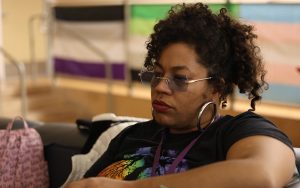
Danielle Fowler at the Thornhill Lopez Center on 4th in Tucson describes how people often have to hide their queer identities to stay safe. (Photo by Jack Orleans/Cronkite News)
Danielle Fowler, a SAAF community programs manager, explained the importance of considering the broader definition of homelessness.
“A lot of people define it as living on the street, but not having a secure, regular or consistent home is actually the definition,” Fowler said. “So couch-surfing, living with a friend, changing homes, those all qualify.”
LGBTQ+ youth who are experiencing homelessness must consider their safety, according to Fowler.
“How someone identifies affects these statistics,” Fowler said. “If it is a shelter for men or for women, how someone identifies will affect whether they even get accepted. So what is more important: my identity or shelter?”
Members of the LGBTQ+ community like Agrella, while addressing the issues the community faces, find it equally important to highlight the beauty of queer joy.
“If you have a space where you can intentionally celebrate each other and the beautiful, incredible parts of your life, I think that’s really important to combat all of the negative energy otherwise in the air,” Agrella said. “Community is everything. If you don’t have community, what do you have?”
If you or someone you know is struggling with thoughts of suicide, the 988 Suicide & Crisis Lifeline is available all hours at 988 or via online chat.


